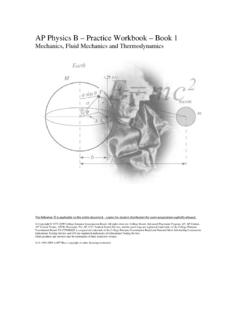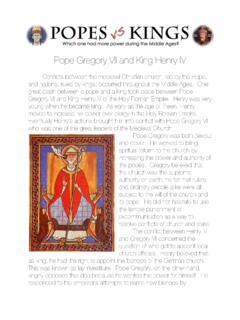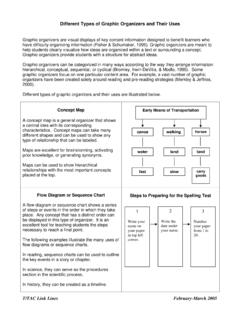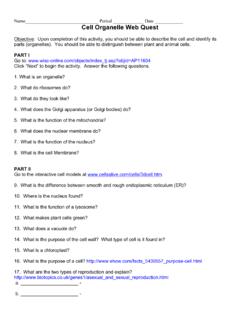Transcription of Plant Animal Cell Diagrams - Licking Heights Local School ...
1 Comparing Plant And Animal Cellsshape - most Plant cells are squarish or rectangular in (starch storage organelle)- an organelle in some Plant cells that stores starch. Amyloplasts are found in starchy plants like tubers and membrane - the thin layer of protein and fat that surrounds the cell, but is inside the cell wall. The cell membrane is semipermeable, allowing some substances to pass into the cell and blocking wall - a thick, rigid membrane that surrounds a Plant cell. This layer of cellulose fiber gives the cell most of its support and structure. The cell wall also bonds with other cell walls to form the structure of the - an elongated or disc-shaped organelle containing chlorophyll.
2 Photosynthesis (in which energy from sunlight is converted into chemical energy - food) takes place in the - chlorophyll is a molecule that can use light energy from sunlight to turn water and carbon dioxide gas into glucose and oxygen ( photosynthesis). Chlorophyll is - the jellylike material outside the cell nucleus in which the organelles are body - (or the golgi apparatus or golgi complex) a flattened, layered, sac-like organelle that looks like a stack of pancakes and is located near the nucleus. The golgi body modifies, processes and packages proteins, lipids and carbohydrates into membrane-bound vesicles for "export" from the - vesicles containing digestive enzymes. Where the digestion of cell nutrients takes - spherical to rod-shaped organelles with a double membrane.
3 The inner membrane is infolded many times, forming a series of projections (called cristae). The mitochondrion converts the energy stored in glucose into ATP (adenosine triphosphate), a high energy molecule, for use by membrane - the membrane that surrounds the - an organelle within the nucleus. Ribosomal RNA is produced here, then exported into the cytoplasm where it forms the - The nucleus is a spherical body surrounded by the nuclear membrane. It contains mostly DNA in chromosomes. The nucleus controls many of the functions of the cell (by controlling protein synthesis). The nucleolus is found within the - small organelles composed of RNA. Are sites of protein endoplasmic reticulum - (rough ER) a vast system of interconnected, membranous, infolded and convoluted sacks that are located in the cell's cytoplasm (the ER is continuous with the outer nuclear membrane).
4 Rough ER is covered with ribosomes that give it a rough appearance. Rough ER transport materials and produces proteins (which are sent to the Golgi body, or inserted into the cell membrane).smooth endoplasmic reticulum - (smooth ER) a vast system of interconnected, membranous, infolded and convoluted tubes that are located in the cell's cytoplasm (the ER is continuous with the outer nuclear membrane). It produces lipids (fats) and membrane proteins; smooth ER buds off from rough ER, moving the newly-made proteins and lipids to the Golgi body for further processing and to the - a large, membrane-bound space within a Plant cell that is filled with fluid, mostly water. Most Plant cells have a single vacuole that takes up much of the cell.
5 It helps maintain water balance and the shape of the - a small, membrane-bound space that helps to transport material in/out or within the cell. Some are storage vessels. eg. proteins produced in the rough endoplasmic reticulum are transported by vesicles produced at the tips of the rough ER, to the golgi body, for Cellshape - most animals cells are roundish or irregular in membrane - the thin layer of protein and fat that surrounds the cell. The cell membrane is semipermeable, allowing some substances to pass into the cell and blocking - during cell division in Animal cells, two pairs of centrioles form from microtubules at each end of the cell. The two centrioles are arranged perpendicular to each other.
6 Microtubules formed in the centriole grow into spindle fibers which then attach to replicated chromosomes and assist in separating them during - the jellylike material outside the cell nucleus in which the organelles are body - (also called the golgi apparatus or golgi complex) a flattened, layered, sac-like organelle that looks like a stack of pancakes and is located near the nucleus. The golgi body modifies, processes and packages proteins, lipids and carbohydrates into membrane-bound vesicles for "export" from the - vesicles containing digestive enzymes. Where the digestion of cell nutrients takes - spherical to rod-shaped organelles with a double membrane. The inner membrane is infolded many times, forming a series of projections (called cristae).
7 The mitochondrion converts the energy stored in glucose into ATP (adenosine triphosphate), a high energy molecule, for use by the membrane - the membrane that surrounds the - an organelle within the nucleus. Ribosomal RNA is produced here, then exported into the cytoplasm where it forms the - The nucleus is a spherical body surrounded by the nuclear membrane. It contains mostly DNA in chromosomes. The nucleus controls many of the functions of the cell (by controlling protein synthesis). The nucleolus is found within the - small organelles composed of RNA. Are sites of protein endoplasmic reticulum - (rough ER) a vast system of interconnected, membranous, infolded and convoluted sacks that are located in the cell's cytoplasm (the ER is continuous with the outer nuclear membrane).
8 Rough ER is covered with ribosomes that give it a rough appearance. Rough ER transport materials and produces proteins (which are sent to the Golgi body, or inserted into the cell membrane).smooth endoplasmic reticulum - (smooth ER) a vast system of interconnected, membranous, infolded and convoluted tubes that are located in the cell's cytoplasm (the ER is continuous with the outer nuclear membrane). It produces lipids (fats) and membrane proteins; smooth ER buds off from rough ER, moving the newly-made proteins and lipids to the Golgi body for further processing and to the - fluid-filled, membrane-surrounded cavities inside a cell. The vacuole fills with food being digested and waste material that is on its way out of the cell.
9 Smaller than Plant cell - a small, membrane-bound space that helps to transport material in/out or within the cell. Some are storage vessels. eg. proteins produced in the rough endoplasmic reticulum are transported by vesicles produced at the tips of the rough ER, to the golgi body, for Comparing Plant And Animal Cells venn DiagramDirections: Fill in the venn Diagram to compare Plant CELLS to Animal CELLS. Use the words in the word box. Add descriptions to show the differencescell membrane cell wall chloroplast cytoplasm shape nucleus ribosome vacuole centriole mitochondria Plant CELL Animal CELL














